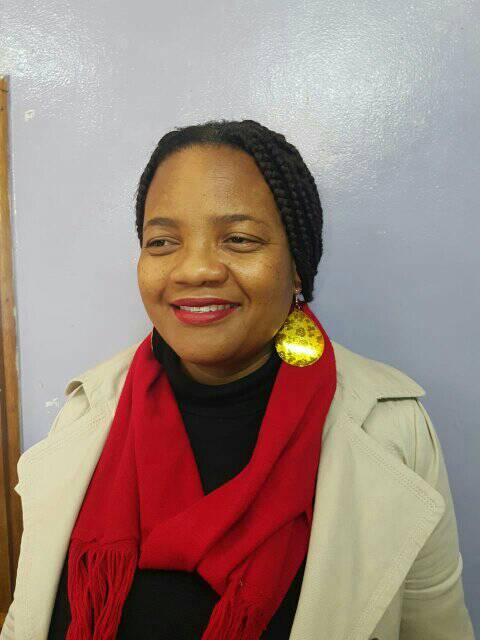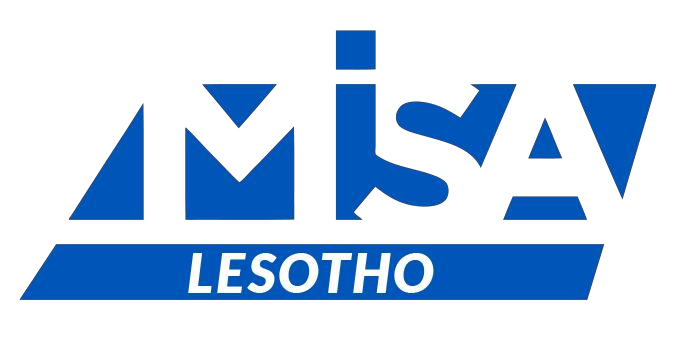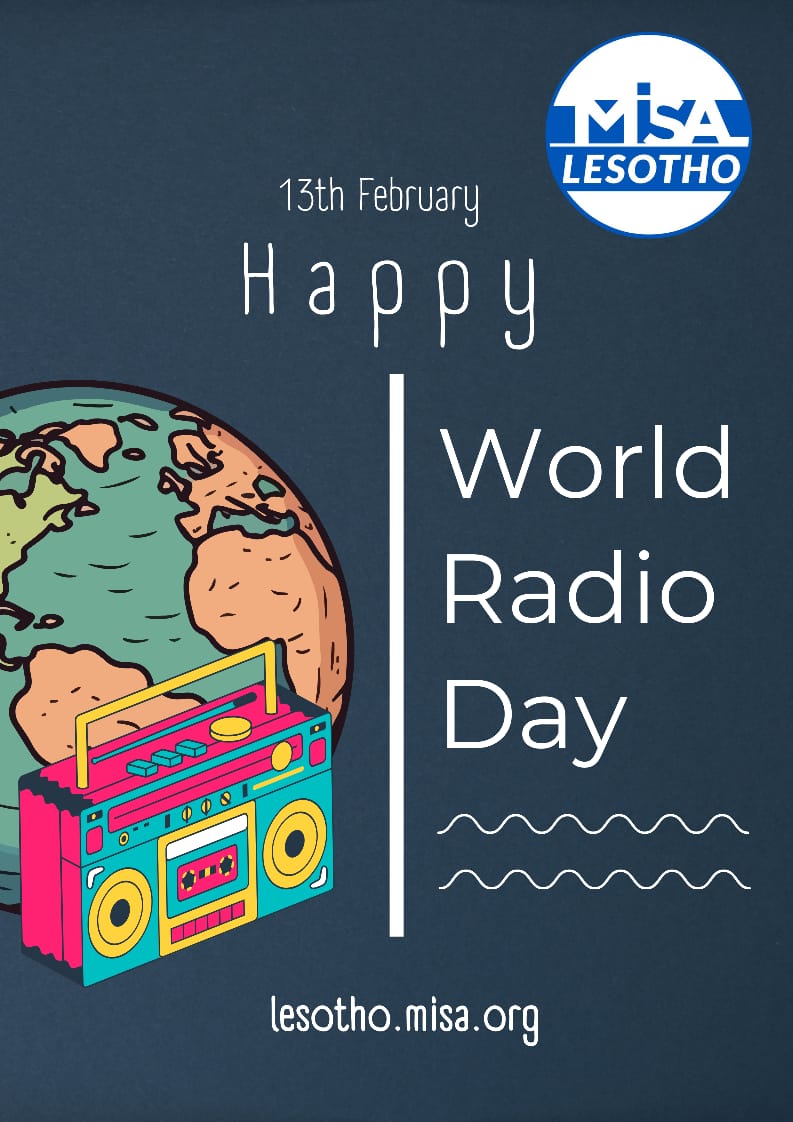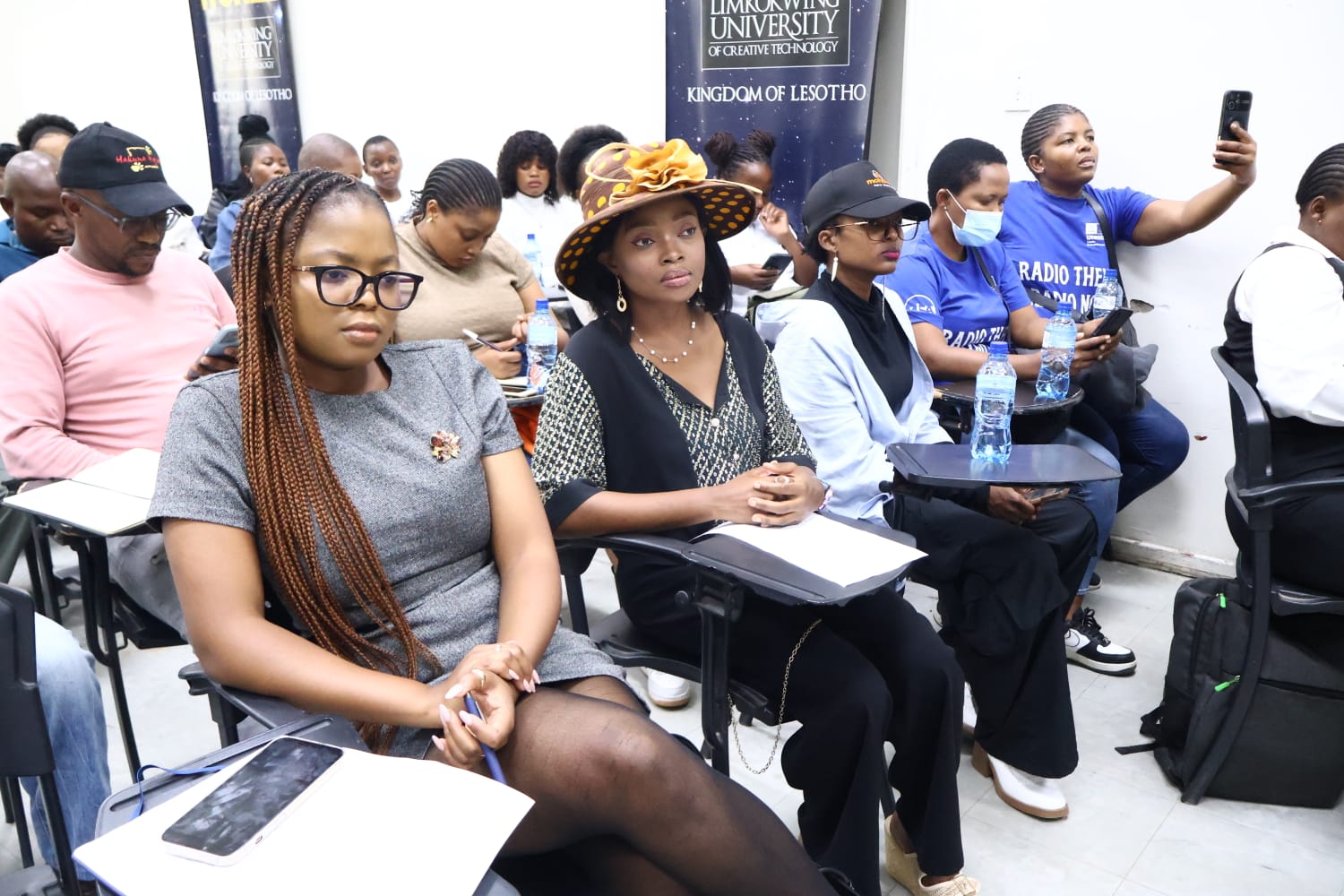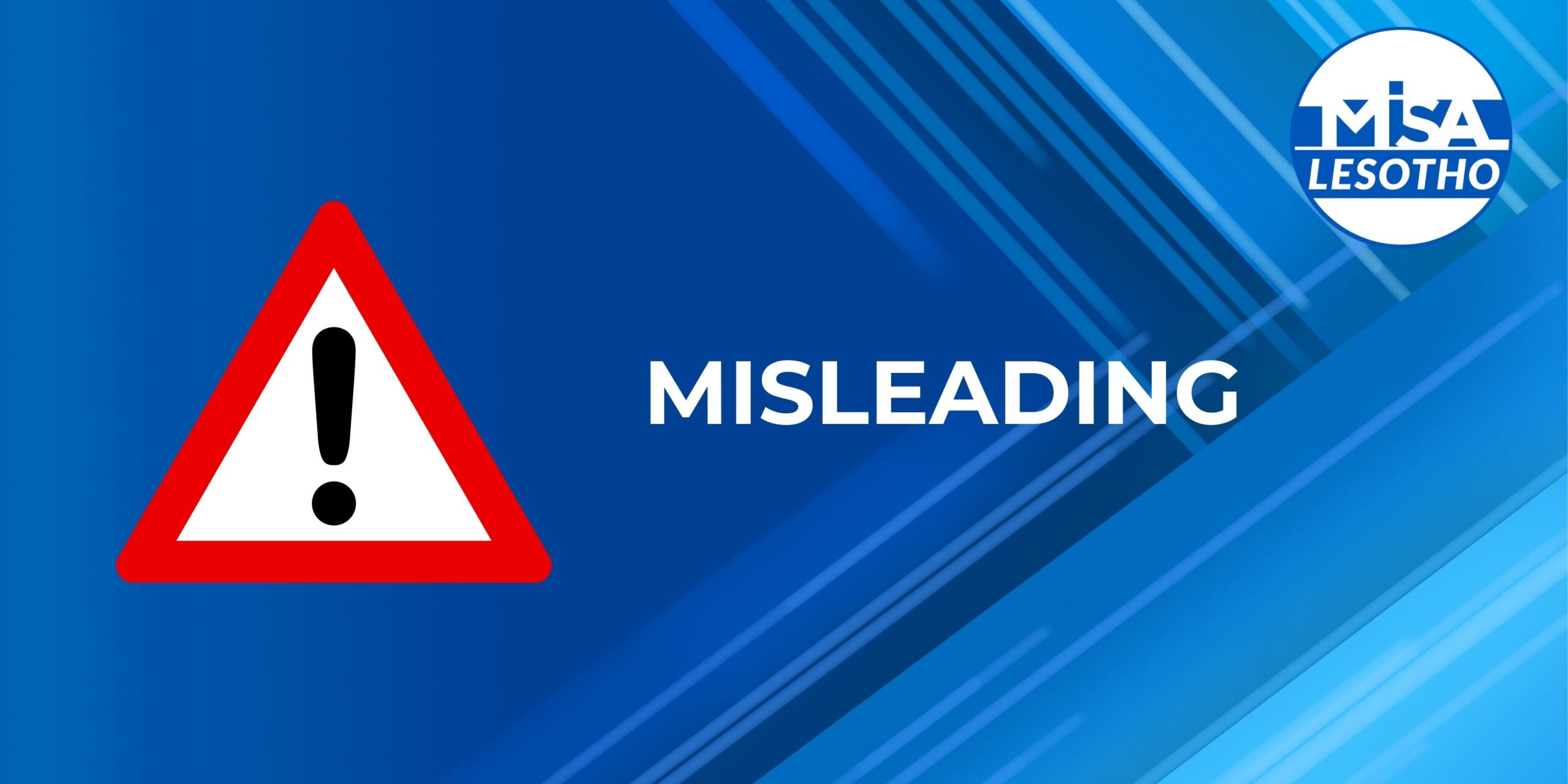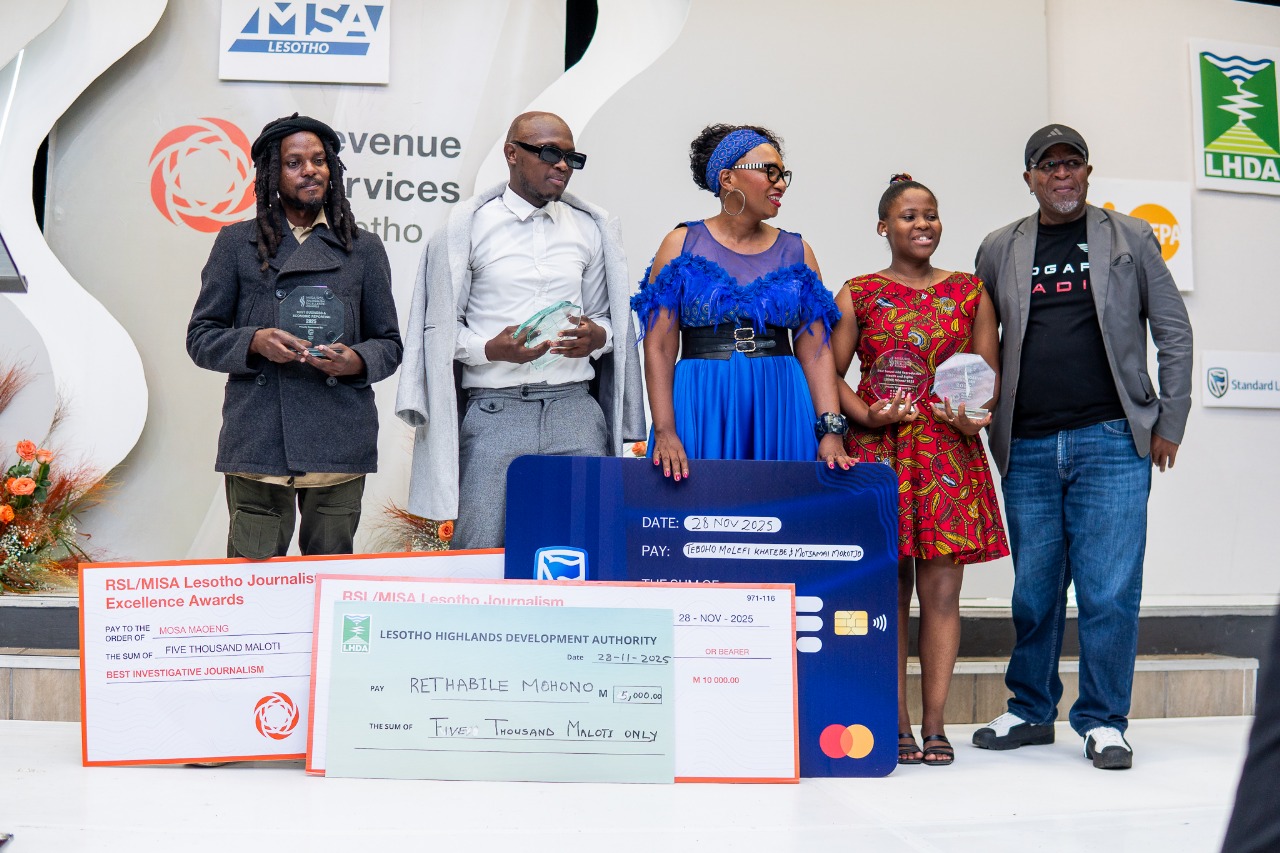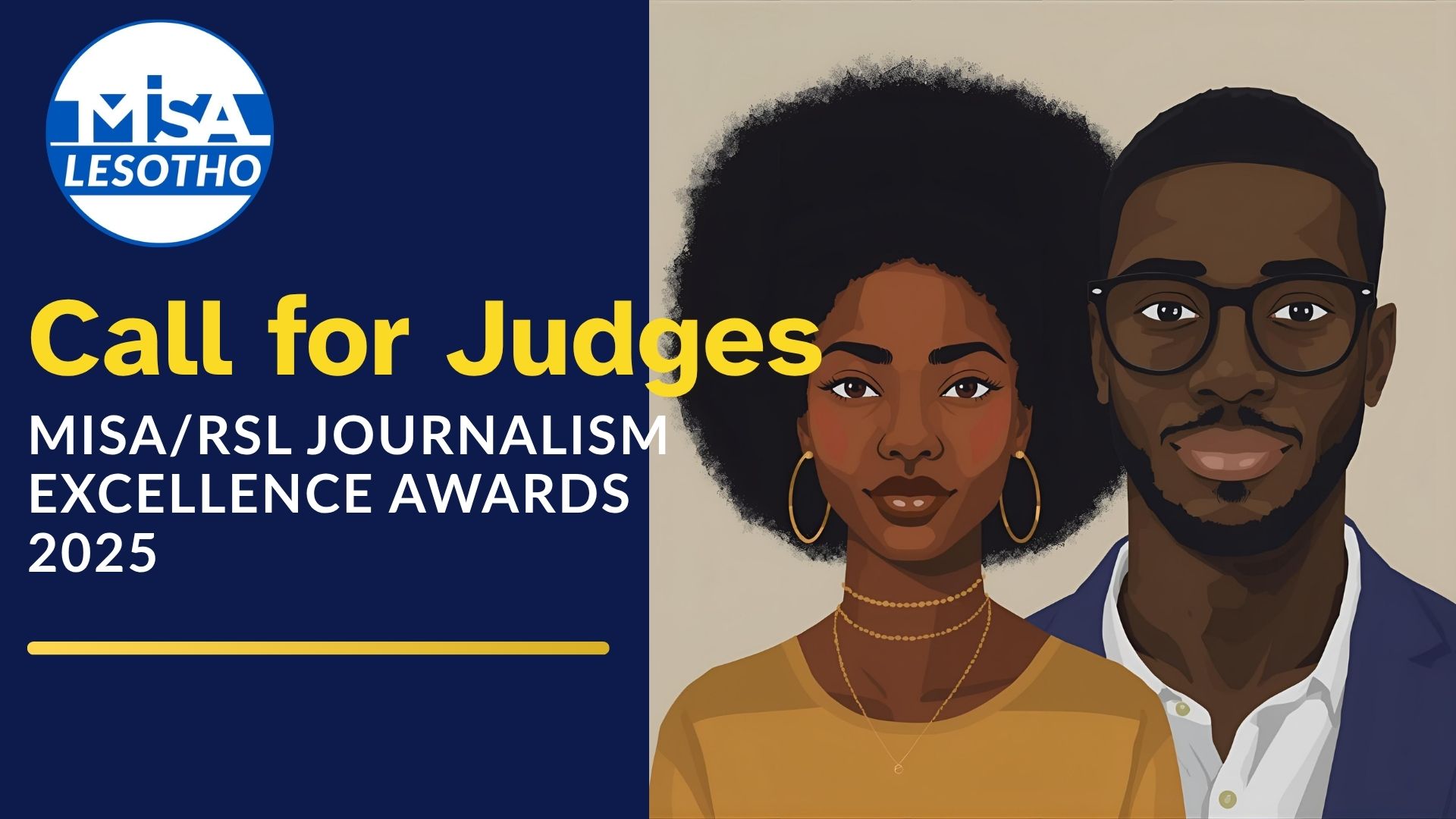INTRODUCTION
This is a Secretary General’s report for the period from April 1st, 2020 to March 31st, 2021 of the Media Institute of Southern Africa – Lesotho Chapter (MISA Lesotho). The report focuses on the main four organizational program areas, namely;
- Policy Advocacy
- Media Freedom Monitoring
- Capacity Building
- Governance and Administration
Additionally, this report will present special reports on the scourge of Covid-19 (how it affected local media plus efforts by MISA Lesotho to mitigate). Also under special reports, this report will present the status of MISA Lesotho Working Committees.
The reported activities are tied to the above-mentioned programs, with every activity assessed to determine the impact made. The activities were implemented against the background of the advent of the Coronavirus pandemic that got into the way of almost every project that was to be implemented. Covid-19 brought new ways of doing things and it was to take time before we could adapt to the new normal. Every program needed to be adjusted or fail. Covid-19 restrictions and lockdowns negatively impacted our daily operations.
The advent of Covid-19 came at the time MISA Lesotho was beginning to find its feet. The momentum of rebuilding the Institute was feasible. Right at the beginning of May 2020, MISA Lesotho secured an M616, 800 one-year children and youth project with UNICEF. Dubbed U-Report, Child Journalists, and Media Advocacy for Child Rights, this was the first-ever children’s project that MISA Lesotho signed with UNICEF for a period exceeding three months. MISA Lesotho had always signed projects with UNICEF but those were always three-month projects, mainly focusing on World Children’s Day celebrated on November 20.
- POLICY ADVOCACY
Media Legal Reforms:
Under the new administration, MISA Lesotho secured the last batch of funds for the Media Legal Reforms project supported by OSISA in April. MISA Lesotho received in its bank account a total of M234, 388.46 for the project that was aimed to escalate the push for the democratization of the media space through media policy reforms.
The project came against the background of the SADC mediated reform agenda in Lesotho, which it is hoped will see the country chart a new democratic path anchored on constitutional order and respect for fundamental freedoms. Under this project, MISA Lesotho was able to achieve the following:
- A comprehensive draft model national media policy framework has been produced. Research on various pieces of legislation in Lesotho was conducted to establish the extent to which they affect media freedom and freedom of expression to inform media legal reforms. Presentation of the research findings was made at a national conference of media legal reforms.
- Key stakeholders including government and selected communities were engaged and mobilized to support media policy reforms. A national policy advocacy campaign was conducted side by side with the National Dialogue Planning Committee through public consultations countrywide.
- MISA Lesotho decided to craft a Position Paper on Media Legal Reforms for a much participatory exercise end aggressive engagement of all players in the media. The document was critically looked at by media proprietors and their inputs were included. It was eventually adopted during sectoral consultations of the SADC brokered multi-Stakeholder reforms to inform the development of the media legal framework.
- Media practitioners understanding and knowledge of the best practice in regulating the media was enhanced and the government was engaged from an informed position.
- A five-member National Media Leaders Forum was established with the government represented.
Events:
In a bid to raise awareness and advocate for change in the Lesotho media sector, MISA Lesotho also commemorates the following days as important advocacy events:
- World Radio Day:13th February
- World Press Freedom Day: 3rd May
- Universal Access to Information Day: 28th September
World Radio Day:
MISA Lesotho, with support of the European Union Delegation in Lesotho and the Lesotho National Commission for UNESCO, organized a commemoration of the World Radio Day Lesotho celebration on February 26th, 2021 under the theme: Radio and Resilience in the Covid-19 Era. The commemoration was highlighted by a two-hour panel discussion at the Lesotho National Commission for UNESCO’s conference hall.
World Press Freedom Day:
In celebration of WPFD 2021, MISA awarded Certificates of Excellence to two outstanding Public Relations Officers: Mr. Mpiti Mopeli (S/Supt) of the Lesotho Mounted Police Service, and Mrs. Mothepane Thahane of the Queen ’Mamohato Memorial Hospital, at a function held MISA Lesotho premises on May 7th, 2021.
MISA Lesotho also issued a statement that highlighted the following activities inimical to press freedom in Lesotho:
- Lesotho appears number 88 worldwide in press freedom rankings, according to the 2021 World Press Freedom Index compiled by Reporters Without Borders. To put things into much better perspective, we are ranked number five in the southern Africa region after Namibia, South Africa, Botswana, and Malawi. Worth noting, we moved two places back from being ranked the world’s number 86 by the same study in 2020.
- MISA Lesotho found the following as key factors disturbing free press in this country:
- Threats and intimidations posed to journalists by those who hold positions with power, more particularly politicians and law enforcement officers,
- Infiltration of party politics into newsrooms, which distracts editorial independence and polarises the media sector,
- Censorship and gagging of the media by the government, including to dangle a carrot by the government on the media through advertising,
- Use of archaic, outmoded, and media oppressive laws that intimidate the sector. These laws include the Sedition Proclamation of 1938, Official Secrets Act of 1967, Internal Security Act of 1984, Parliamentary Powers and Privileges Act of 1994, and many others,
- Failure by the government and parliament to approve or enact modern laws that are media-friendly. For instance, a draft media policy that became a mantra by MISA Lesotho for over two decades, as well as the Access to and Receipt of Information Bill of 2000, to mention just a few,
- Failure by the government to transform the Lesotho National Broadcasting Service (LNBS) from the state into public ownership.
General Assessment
On a positive note, this year’s edition of the WPFD celebration comes a few days after the National Reforms Authority (NRA) adopted two policy documents that have the potential to free the country’s media sector from subjugation – a draft National Media Policy and draft National Code of Conduct, Behaviour and Practice.
The media sector has been identified as one of the key thematic areas for reform in the ongoing multi-stakeholder, multi-sectoral national reforms currently driven by the NRA. MISA Lesotho views the adoption of the two documents by the NRA plenary, following consultations with stakeholders, as a step closer to the milestone, having lobbied and advocated for the government and parliament to approve and enact modern media laws for over two decades without success.
This year’s edition of the WPFD celebration coincides with the 30th Anniversary of the 1991 Windhoek Declaration for the Development of a Free, Independent, Pluralistic, and Diverse Press which gave birth to WPFD. The Windhoek Declaration, as commonly known in a short form, also gave birth to MISA Chapters in 11 African countries.
Coming back home, this year’s WPFD celebration also marks 25 years since the transformation of what used to be called the Media Institute of Lesotho (MILES) – Media Resource Centre into MISA Lesotho in 1996. It is therefore salient to briefly reflect on noticeable strides that MISA Lesotho has made, as an advocacy and lobby nongovernmental organization and a product of the Windhoek Declaration, to advance press freedom, independence, plurality, and diversity.
MISA Lesotho has, for the past 25 years, lobbied and advocated for a conducive legal and policy environment where media owners, editors and practitioners, and journalists operate. MISA Lesotho had driven the campaign for freedom of expression of opinion and that of the media.
International Day for Universal Access to Information:
This day was not celebrated due to a lack of funds and the unwillingness of financial partners to finance it. Financial proposals sent to UNESCOM, EU, US Embassy, and OSISA, among others, were all unsuccessful.
- CAPACITY BUILDING
U-Report, Child Journalists, and Media Advocacy for Child Rights
Under this project, UNICEF partnered with MISA to address the structural, socio-cultural, and demand factors contributing to the challenges facing young people. Through the project, national media houses and adolescent volunteers were equipped with the capacity to use social accountability mechanisms, including U-Report, to identify bottlenecks in access to social services.
MISA Lesotho was the partner best positioned to implement this project because the Institute has the required technical capacity to train young people in both traditional and new media. MISA Lesotho is a strategic point of departure for media attention as the organisation is central to media issues in the country.
MISA Lesotho equipped project participants, including adolescents and young people with skills to dialogue, advocate, and address challenges of social service delivery. In the process, media houses were capacitated to develop human interest stories based on the findings from U-Report, closing the accountability loop.
MISA Lesotho further held joint capacity-building workshops with the following partners: World Vision, UNFPA, National Aids Commission, Ministry of Health, and Office of the UN Resident Coordinator.
- MEDIA FREEDOM MONITORING
Utterance by BNP Deputy Leader and Foreign Affairs Deputy Minister Machesetsa Mofomobe Against Newspaper Editors of Foreign Origins
On September 22nd, 2020, MISA Lesotho issued an expression of concern over unwillingness and lack of interest by then-Deputy Leader of Basotho National Party (BNP), who is also Deputy Minister of Foreign Affairs, Machesetsa Mofomobe, to cooperate with MISA Lesotho regarding his remarks against local newspaper editors of foreign origins on August 12th, 2020.
During a media briefing at the BNP premises on August 12, Mofomobe referred to the expatriate editors as “Makoerekoere”, which is tantamount to hate speech.
MISA Lesotho learned from Mofomobe’s statement that he was aggrieved by how the newspaper/s edited by the expatriates reported about then BNP leader and Minister Communications, Science and Technology, Thesele ’Maseribane.
Following this, on August 17th, 2020, MISA Lesotho wrote to the deputy minister, requesting a meeting with the hope of bringing the two sides to a round table with the aim of reaching an amicable and peaceful solution. Mofomobe had not responded to the proposal. Instead, he allegedly published on Facebook that he did not recognize MISA Lesotho as it is not a statutory organization.
The deputy minister had further, during an interview with Mafeteng Community Radio later in the month, acknowledged receipt of the letter from MISA Lesotho that proposed the meeting, but he argued he was not interested in the meeting because MISA Lesotho had already judged him in an interview with another radio station.
PM’s threats against Media Freedom
MISA Lesotho, on September 23rd 2020, submitted a letter of concern to Office of the Prime Minister over a statement he made on September 14th 2020 while addressing the media at premises of the Ministry of Health.
During a post ministers’ induction media briefing on the above-mentioned date, PM announced the government was working on classifying some of its documents/information and that any media organisation which publishes confidential government information would be liable to prosecution. The premier said it was a was prosecutable offense for the media or anyone else to publish or to be found in possession of classified government information.
In the Lesotho Times issue of September 17-23 2020, the prime minister was quoted saying: “Anybody who is not authorized to be in possession of classified government documents is committing an offense. So, when the media gets hold of classified documents, you should know that it is illegal.”
Further in the article, the premier was quoted adding: “Once classified, the contents of those documents cannot be leaked. Even your (media) inside source is not expected to leak those documents. As the fourth estate, you are always referring to well-placed inside sources in your stories. We keep wondering where those inside sources are. Government documents are leaked to social media and at times top classified secrets are leaked by your inside sources.”
MISA Lesotho found the prime minister’s statement utterly posing threat to press freedom and interfering with the editorial independence of the media. Most directly, the prime minister’s statement had a chilling effect on the right of Basotho to access and receive information.
MISA Lesotho had since brought to the attention of the prime minister that one of the key functions of the media is to perform a watchdog role to promote transparency and accountability in leadership. Inter alia, the function of the media is to provide information for the nation. The media is an agenda-setter. This is how the media, in any state, contributes to the development of nations.
MISA Lesotho is committed to ensuring that the media does not become a lapdog of the government. Coming from the head of government, MISA Lesotho views the prime minister’s statement characteristic of the following chilling connotations against freedoms of expression and media, as well as the right to access and receipt of information as pillars of democracy:
➢ Threatening to media against performing its watchdog role,
➢ Interfering with the editorial independence of the media,
➢ Casting a shadow of doubt on political willingness the government to implement the
envisaged media reforms within the national multisector reforms process,
➢ Suggesting lack of willingness on the part of the government to enact the Access to
and Receipt of Information Bill of 2000,
➢ Symbolizing unwillingness by the cabinet to approve the Media Policy that has
become a mantra since the early 1990s, and
➢ Signaling the government’s quest to micromanage, censor or even silence the media
MISA Lesotho advised the Honourable Prime Minister to retract the statement or provide justifiable clarification at his earliest and reasonable convenience. PM never responded.
Shooting of Newsday Journalist Ntsoaki Motaung by Police
On November 6th, 2020, the Newsday newspaper journalist Ntsoaki Motaung was shot by members of the Lesotho Mounted Police Service (LMPS) during the youth protest dubbed #BachaShutDown. MISA Lesotho observed with disappointment about the arrests of other journalists who were on duty during the fateful Friday, by the police.
In a media statement that MISA Lesotho released on November 10th, 2020, the Institute categorically condemned acts of police brutality and the harassment of journalists by the LMPS members during the protest. MISA Lesotho had since requested the Commissioner of Police to publicly provide an account of events of Friday, November 6th, 2020, particularly relating to the role played by the members of LMPS manning the youth protest.
In a letter dated November 9th, 2020, MISA Lesotho implored the Commissioner to make the public statement within seven (7) days of receipt of the correspondence by his office, lest it was by the authority of the Commissioner of Police that the LMPS members victimized the journalists on duty on Friday, November 6th, 2020. The Commissioner had never responded to the letter.
Politicians Masquerading as Journalists
On February 9th, 2021, MISA Lesotho issued a statement of concern on the growing rate of conduct by some “journalists” who actively meddle in the affairs of political parties under the guise they are doing their job as media practitioners, yet theirs is clearly to campaign for and against certain political parties openly on social media platforms hoping for their own personal gain.
These pseudo-journalists, MISA Lesotho has come to observe, are either used by some political elites to propagate political party differences on social media or are active politicians themselves masquerading as media professionals, abusing journalism as their channel into political recognition.
They disregard and violate all ethical practices and conduct enshrined in journalism as they engage themselves in political party differences on social media – behaving much like foot soldiers for certain political elites. What is most saddening about these pseudo-journalists is that they tend to seek refuge at MISA Lesotho when they lose their personal political fights. They drag MISA Lesotho’s name into disrepute by using the Institute as their umbrella in their personal political battles. MISA Lesotho issued the statement to distance the Institute from media practitioners who are unsure whether they are “journalists” or active party politicians.
SPECIAL REPORTS
- COVID-19 – Media Relief Fund
In December 2020, MISA Lesotho launched the Covid-19 Media Relief Fund with the intention to save the country’s media sector from the economic brunt resultant of the pandemic. A brief survey conducted by MISA Lesotho in 2020 showed how the media sector suffered from the chilling effects of the advent of Coronavirus.
Tens of media houses have cut their staff benefits, including monthly income. Others have retrenched media journalists, and in some instances, media managers have had to implement both salary cuts and retrenchments. At least one newspaper publication has since closed business altogether due to the pandemic. The situation could exacerbate with the third wave already knocking on the door.
While the advent of Covid-19 is a blanket problem whose chilling effects have affected every societal facet, it is only prudent to engage everyone on recovery strategies for specified sectors in order for us to win the fight against the pandemic. The MISA Lesotho Covid-19
Media Relief Fund is one such strategy aimed at saving and supporting the country’s media sector to recover and sustain amid challenges of the pandemic.
The MRF has seen success at least in two phases: Office of Prime Minister Dr. Moeketsi Majoro donated food parcels in contribution to the initiative. The food parcels were 50 x 10kg bags of maize meal and 50 x 5kg packages of sugar beans. The food parcels were distributed to 50 journalists in the following order of categories:
- Journalists who lost their jobs during and because of COVID-19,
- Journalists whose benefits were cut by their employers during and because of COVI19,
- Journalists who lost their immediate family members because of COVID-19,
- Journalists in the independent and private media sector, including community radio stations, and
5.Journalists who are active members of MISA Lesotho
In the first phase, media houses and practitioners benefited by receiving PPE, which was distributed to 40 mainstream media outlets, thanks to the Rotary Club of Maloti.
Safety of Journalists in the outbreak of Covid-19
On January 12th, 2021, MISA Lesotho issued a media statement, appealing to all media houses and practitioners to strictly observe Covid-19 safety protocol and stay safe amid the second wave of the pandemic. These were times during which Basotho desperately relied on information and education from the media in order for them to stay safe against the sweeping pandemic.
The media itself was not spared from the brunt and chilling effects of the advent of Coronavirus. Many media houses cut staff benefits and retrenched practitioners as a result of the pandemic. Some had even closed down businesses. It was imperative to save our media then more than any other time as it plays a frontline role in mass information dissemination and education in the fight against Covid-19.
MISA Lesotho further made a clarion call to every stakeholder in the media sector to save our media (#Save_our_media) by discouraging and snubbing physical media gatherings/press conferences, but resort and encourage media releases and virtual conferences for information sharing.
MISA Lesotho advised and recommended to all media proprietors, publishers, editors, and managers to effectively invest and embark on remote working, except where strictly necessary for staff to be in office and observant of safety protocol.
- WORKING COMMITTEES’ REPORTS
During the period under review, MISA Lesotho established five Working Committees that would work hand-in-hand with the office of ND and report to the NGS on regular basis. The Committees are:
- Media Advocacy (Chaired by SG)
- Media Freedom Monitoring (Chaired by Former Chairperson)
- Human Resources (Chaired by Member 1)
- Entertainment & Recreation (Chaired by Member 2)
- Fundraising, Finance & Audit (Chaired by Treasurer)
Below is a report of Media Advocacy Committee:
MEDIA ADVOCACY COMMITTEE
Immediately after its establishment in December last year, Media Advocacy Committee identified what it deemed important in the daily operations of journalists and reporters. What sat on the helm of the to-do list was to ensure that the committee smooths way for journalists in various institutions and iron whatever differences existed between the institutions and the media, as it was evident that there were/are issues that did not sit well with the two parties, especially those that have frequent interaction with the media.
The committee also identified establishment of more community radio stations as a necessity if MISA Lesotho was to see its mandate through.
This was a 6-month plan. The second work-plan was to be drawn at the end of June, on completion of the first one, but due to Covid-19 restrictions, a number of items in the work-plan did not see the light of day, meaning, the second work-plan cannot be drawn and executed on time.
Going back to harmonization of relations between the media and different institutions, the Media Advocacy Committee managed to secure a meeting with the Registrar of the High Court, and among others, the discussion focused on the following:
- Court reporters clashing with police officers to enter courtrooms, especially on high-profile cases.
- Delay in obtaining judgments and other legal documents for the accuracy of their stories.
- The hostility of judges towards reporters
- When the PRO is off-duty, there is no one to assist reporters with legal documents.
At the time, the meeting was perceived to have been successful, but court journalists have reported that problems 1 and 4 have not been resolved. This means there is a need for further engagement between the committee and the National Governing Council of MISA Lesotho.
In June this year, the NGC had a familiarization meeting with a new Minister of Communications, Mr. Tsoinyane Rapapa, and the meeting was also considered to have been a success, but there is still a challenge of what seems to be ‘closed communication channels’ between the Minister’s office and MISA.
Even though the committee had targeted quite a number of offices for familiarization and harmonization of relations, that never happened except for the above mentioned, partly as a result of covid-19 and partly due to the reluctance of officeholders to meet with MISA.
- Establishment of radio stations
On February 26, the committee took a trip to Mokhotlong with the aim of meeting the Thabana-Ntlenyana radio station founding committee, to work on a fund-raising plan and setting clear time-frames for the plan. MISA Lesotho had planned to have the radio station up and running by August this year.
The founding committee tabled a challenge that they have encountered and they said the community has been reluctant to raise funds towards the acquisition of a license.
However, the District Administrator (DA), assured the Media Advocacy Committee that by March-end, all the money that is needed would be there, promising that he would do everything in his power to see to it that the local business community assists, including mining companies.
It is with remorse to point out that at the writing of this report, the DA and the radio station founding committee have not delivered on a single resolution that was made in the February meeting. Both the founding committee and the DA have gone mum, despite several follow-up attempts.
Semonkong
In February, the Media Advocacy committee got hold of one founding committee member of Semonkong radio station, whose equipment, like that of Mokhotlong is still in MISA’s possession, and the committee agreed with the contact person to have him organize a committee for a meeting with MISA.
Sadly, the said member passed on before he could give all the necessary information including the contact numbers of those committee members he had organized.
Lastly, the committee identified two districts, Mohale’s Hoek and Berea for installation of a community radio station whenever funds permit.
Recommendations:
- The Media Advocacy Committee recommends that as soon as the Covid-19 curve flattens, all outstanding relations harmonization meetings be carried out as quickly as possible, before December.
- By-pass the DA in the Mokhotlong issue, because part of the founding committee members believe he is the one delaying the whole process to ensure that people do not have access to information, especially on political issues, seeing that the country is heading for general elections.
- Media Advocacy Committee visits Semonkong, meets with community councilors and local chiefs for the revival of the radio station committee, before December, so that before the end of the financial year, the radios station is installed.
MEDIA ADVOCACY COMMITTEE:
Chairperson – Palesa Maharasoa-Moeletsi (Ms)
Pascalina Kabi (Ms)
Thoboloko Ntšonyana (Mr)
Nkoli Mabitso (Ms)
Governance and Administration
Governance
- Annual General Meeting: An elective AGM that was held on May 29-31 2020 saw the election of the following members as current governors in the NGC:
- Chairperson: Nkoale Oetsi Tšoana
- Deputy Chairperson: Kananelo Boloetse
- Secretary-General: Palesa Maharasoa
- Deputy Secretary: ’Masootho Lephoto
- Treasurer: Pulane Ntjantja
- Member: Thapelo Mabote
- Member: Lekhanya Mpesi
Administration
- Projects
MISA Lesotho has the following projects going on:
| Project | Timeframe | Supporter |
| Children in Media | November 2019 – April 2020
|
UNICEF Lesotho |
| Influencing Media Reforms in Lesotho under the SADC Reform Agenda | October 2019 – April 2020 | OSISA |
| U-Report, Child Journalists, and Media Advocacy for Child Rights | May 2020 – March 2021 | UNICEF Lesotho |
- Staff
| TITLE | NAME | CONTRACT END |
| National Director | Lekhetho Ntsukunyane | March 31st, 2025 |
| Finance Administration | Nthati Mokhobo | March 31st, 2023 |
| Studio Technician | Kananelo Seboka | Casual |
| Intern | Lebohang Tseko | September 31st, 2021 |
| Digital Officer | Moliehi Tsoinyane | Three-months renewable |
| Office Assistant | Tšepiso Lesaoana | Three-months renewable |
| Gardener | Mahlomola Mahlomola | Three-months renewable |




